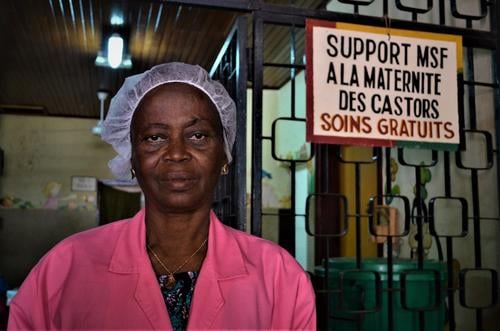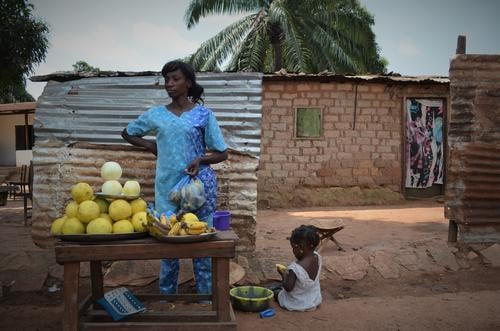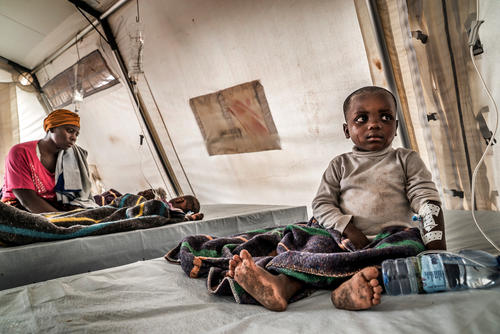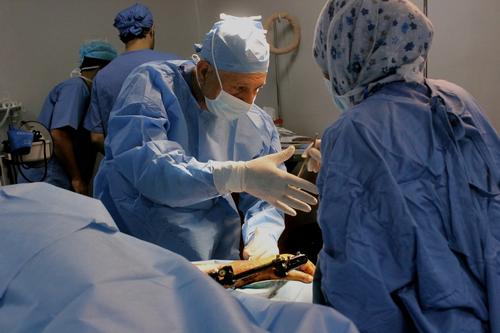1.People die or get sicker
Ms Marie-Josée Yakité, MSF midwife at the Castors HRUB since 2014
When people simply don’t have the means to pay either formal or informal healthcare fees, they are de facto excluded or delayed from receiving care and aren’t treated in time. This can lead to death or complication from treatable diseases such as malaria and can happen even when seemingly small amounts are requested.
Reality check
In the Democratic Republic of Congo, a 2017 MSF population survey in the health zone of Bili, northern Ubangi showed that in a quarter of cases of illness preceding death, no care was sought. Of these, 27 per cent were attributed to a lack of money.
2.People receive sub-standard or incomplete treatments
When drugs and treatment are unaffordable, people may get less effective treatments or not the full package of care they need.
Reality check
At a health centre in Malawi, some mothers receive only half of the pills needed to treat their children for malaria as they are unable to pay the full amount (equivalent to 9 USD), thereby putting the children’s lives at risk.
3.Prevention of diseases is reduced
When people are asked to pay for prevention services such as vaccination or screening tests, they are more likely to opt out, putting themselves or others in danger, especially if they carry communicable diseases.
Reality check
In Central African Republic, a pregnant woman is asked to pay the equivalent of 2.7 US dollar for an HIV test but she can’t afford it.
4.Treatment for disease requiring care over an extended period of time becomes more complex and, ultimately, more expensive
Patients who need (life) long, uninterrupted, or repeated treatment and key priority health services, such as treatment for HIV, tuberculosis (TB), malaria, and maternal and child care dropping out of care because of the recurrent costs.
Reality check
Close to one in four HIV patients hospitalised in the MSF-supported hospital wards in Kinshasa die because the illness is too advanced by the time patients seek care. Over half of these patients were previously on treatment but interrupted it, with a lack of money as one of the main reasons.
5.People become poorer
There are countless examples of people having to borrow money or sell belongings in order to pay for healthcare, impoverishing their entire family.
Reality check
In a study undertaken by MSF in five districts in Afghanistan, 44 per cent of people who sought care had to borrow money or sell some belongings to get treated.
6.Patients are kept imprisoned in health facilities until they pay
As absurd as this may sound, there are countless examples of people who are kept captive in health facilities until they have paid the fees they owe.
In a rural area of DRC, a mother and her baby are not allowed to leave the hospital until they pay 38 USD for an emergency caesarean that saved their lives.
7.Epidemics go unnoticed or underreported, delaying response
When people decide not to seek care or to delay their visit to health centres, it increases the risk of expansion and continued disease transmission in communities.
Reality check
During the recent Ebola outbreak in Likati, DRC (August 2017), the introduction of free healthcare by health authorities led to an increase in outpatient consultations and hospital admissions, which in turn enabled better detection of suspected cases.
8.It’s more difficult for vulnerable groups to access health services
Vulnerable groups such as the elderly, the poor, refugees and women and children will usually be most affected by user fees as they have less access to services, less means or less rights.
Reality check
A refugee in Jordan stopped treatment for her non-communicable disease because she can’t afford the fees (23 US dollar per consultation).






